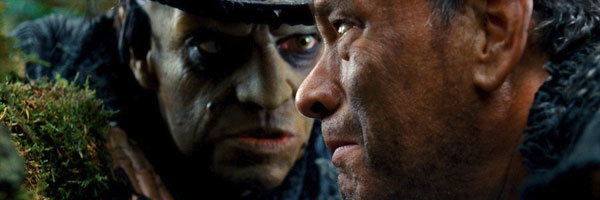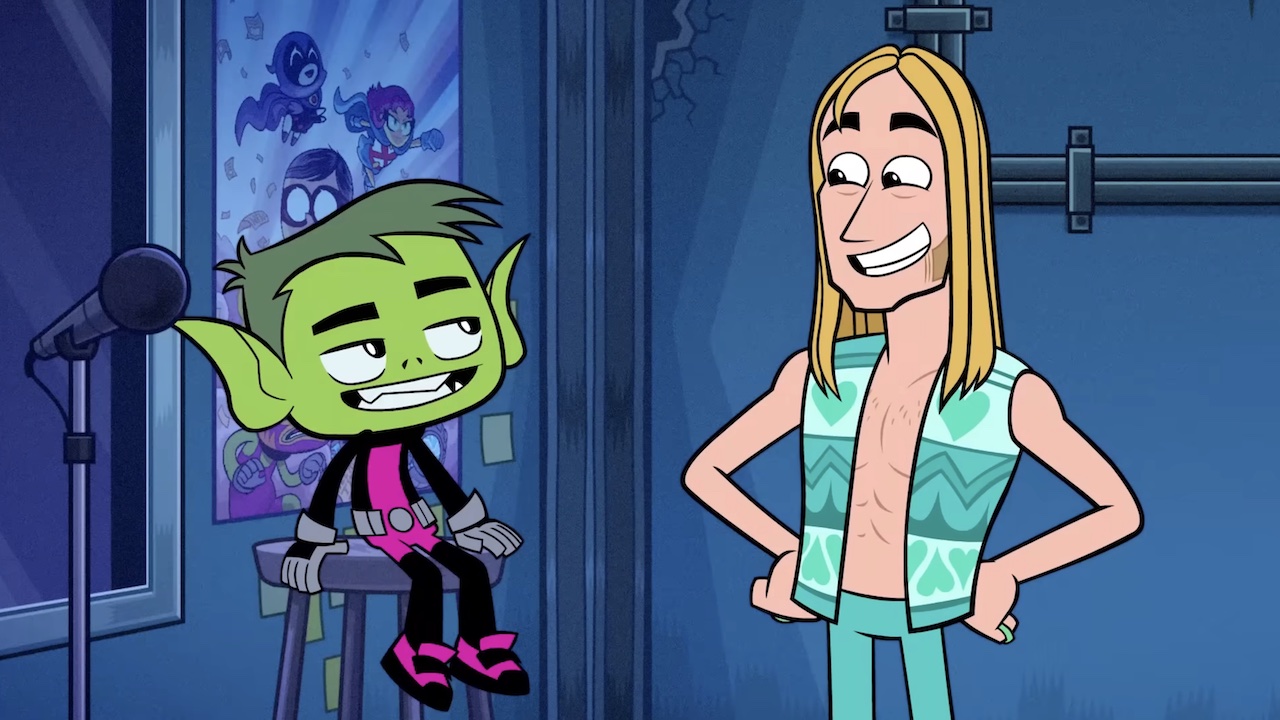Cloud Atlas is the most expensive independent film ever made, a $100 million production cobbled together from international financiers in what is quite clearly a labor of love. Directors Andy and Lana Wachowski teamed up with Tom Tykwer to adapt a novel anyone would logically call unfilmable-- six stories, set across centuries and continents, linked not through characters or plot but the headiest, and most sentimental, of themes.
The fact that Cloud Atlas works at all-- and even its naysayers admit it's never boring, even at 172 minutes-- is a marvel. The fact that it emerges intact with its deep earnestness, head-spinning number of ideas and audacious techniques is a kind of miracle, the best example of how budget and ambition can inflate but result in something personal and dazzling. Ditching the nested structure of David Mitchell's novel and instead chopping up and layering the six stories over one another, Cloud Atlas doubles down on the book's themes of souls reoccurring across time, casting 10 or so actors in multiple leading roles in different stories. It also presses hard on themes the book only hinted at, from the eternal struggle of the weak to stake their claim in society to the timelessness of love. This is all stuff that would make you change seats if someone next to you on a train started talking about it, but a movie as big, heartfelt and gorgeous as Cloud Atlas has a way of making you not just pay attention, but walk out reeling from ideas that might have seemed hokey three hours before.
Briefly, the stories. We start in the 1840s, where Adam Ewing (Jim Sturgess), an American merchant, is traveling by boat across the Pacific and befriends both a scoundrel of a doctor (Tom Hanks) and Pacific Islander slave (David Gyasi) who has stowed away and begs Ewing's help to find freedom. In the 1930s, in Scotland, the brash young composer Robert Frobisher (Ben Whishaw) has arrived, uninvited, at the home of legendary musician Vyvyan Ayrs (Jim Broadbent) and become his assistant; he seduces Ayrs's wife while also writing of all this in letters to his one true love, Sixsmith (James D'arcy). By the 1970s Sixsmith has moved to San Francisco and helps an enterprising journalist (Halle Berry) uncover a dangerous conspiracy at a nuclear plant. In the present, a publisher (Broadbent) winds up confined to a nursing home staffed by a brutal nurse (Hugo Weaving) and planning his escape. Leaping into the future, and over to the city called Neo Soul, we meet Sonmi-451 (Doona Bae), a clone who achieves a higher consciousness and teams up with freedom fighter Hae-Joo Im (Sturgess, again). And finally, way way into the future, Tom Hanks is Zachry, a primitive goat herder who speaks in pidgin English and warily befriends a woman (Berry) who holds the last knowledge of civilization "before the fall" and needs Zachry's help.
You can catch some of the themes right there, from people helping one another against what they believe is their self-interest to slaves asserting their rights. Each of the stories often play out on their own in unbroken segments of 15 minutes or so, but Cloud Atlas is at its most stirring when they're layered over each other-- watching Sonmi-451 and Hae-Joo escape government forces while the slave Autua proves his sailing skills on the ship, or watching two characters in two different timelines make nearly identical, life-altering choices. But as heavy and dramatic as Cloud Atlas can be at moments, it has a sense of wonder at its own ballsy accomplishment, a lightness and good humor that makes it so wonderfully entertaining. Watching the actors swap genders and races and many, many wigs across the timeline becomes a sort of game-- oh wait, that is Hugo Weaving in that nurse's uniform!-- that draws you in, until one of the recurrences carries with it an emotional wallop that reminds you just how invested you've become.
The closest the film comes to telling one unified story is in casting Tom Hanks in four central roles (and two cameos), going from the murderous doctor on the Pacific ship to the good-natured and eventually heroic Zachry, on the unnamed Pacific isle in the future. Hanks is probably our best, most inherently likable movie star, and as Cloud Atlas spins wildly and threatens many times to fall apart, Hanks's characters bring us back-- we want to like him, we want to see him succeed, and when he finally does, it's an emotional catharsis earned by nearly three hours of the film, by Hanks's decades-long career, and by the centuries of Cloud Atlas's stories.
Mitchell's book was so much about language and storytelling, with all six of the stories told in different literary styles, and the Wachowskis and Tykwer have wisely ditched this in favor of many different cinematic powers, from the meta-textual (we like Tom Hanks, so we like Zachry) to the thrills of genre (Sonmi-451's sci-fi story quite deliberately resembles The Matrix, while Berry's Luisa Rey is a classic accidental detective) to the simplest and most stunning of film craft (editor Alexander Berner doesn't deserve an Oscar-- he deserves a medal). Movies like Cloud Altas come around so rarely, both because cobbling together $100 million on your own is an insane feat, and because few people dream as fully and guilelessly as the Wachowskis and Tykwer have. Cloud Atlas comes to theaters a big, swimming ball of feelings and open hearts and cinematic joy: I found it impossible not to love it in return.
Staff Writer at CinemaBlend












